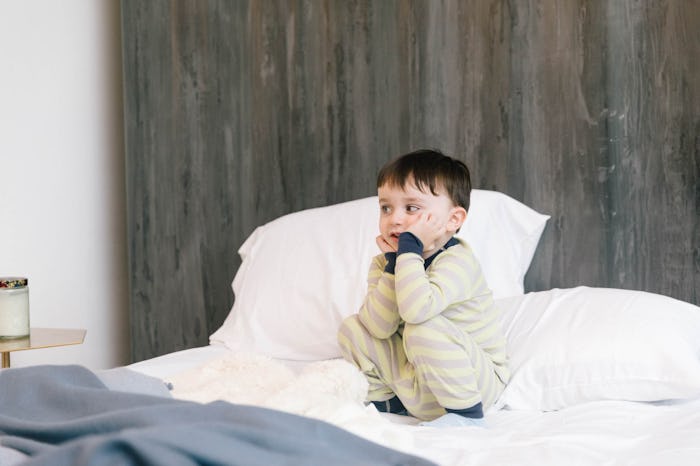Life
Everything You Need To Know About Oppositional Defiant Disorder
When your young child is throwing things, cutting up their sibling's clothes, and defying you at every turn, it's not crazy to wonder if something's gone wrong. However, it's crucial not to let parental anxiety get the best of you — though that's easier said than done, especially when you're dealing with chaos at home. Likely you've read articles on the internet or in magazines about ODD. But what is oppositional defiant disorder? For a very few, it's a troubling pattern of rageful, defiant behavior that requires treatment, according to Mayo Clinic. For the vast majority, though, defiance and anger are a normal part of growing up. Which isn't to say you shouldn't seek help if you're struggling — learning to have healthy interactions with your child when they're young, and keeping out of negative cycles, is always a worthwhile endeavor.
Children with oppositional defiance disorder may display irritability, aggression, and even vindictiveness. As a clinician, Dr. Kyle Pruett, Executive Advisory Board Member of The Goddard School and clinical professor of Child Psychiatry at Yale School of Medicine, needs to know about the intensity of a child's anger. How disruptive are they to the household or classroom? How frequently are they displaying extreme behaviors?
"In the diagnostic criteria we talk about, the child often argues with adults. They really try to press your buttons, they annoy people, and they seem very thin-skinned," he explains. "But those behaviors have to last for at least six months, because all children, healthy and otherwise, can exhibit some of those symptoms at certain times in their lives."
While understandably troubling to caregivers, defiance can be part of normal development — a phase children must go through as they explore "the limits of love, aggression, and trust." Pruett notes that some children may only display ODD behaviors when the family is going through a stressful time — for instance, a move, or an impending divorce.
Pruett also worries that anxious parents (and that's all of us, right?) may be jumping at shadows, hyper vigilantly looking out for disorders they read about online. He himself is reluctant to make a diagnosis of ODD in very young children for two reasons. First, because of the plasticity of child development (your brain is still developing well into your mid-20s), and second, because a serious diagnosis can be difficult to shake.
Being labelled clinically oppositional and defiant is a heavy burden for any child to shoulder, and for Tovah Klein, Ph.D, Director of the Barnard College Center for Toddler Development and author of How Toddlers Thrive, vanishingly few young children truly suffer from the disorder. She explains:
"I think we live in an era when expectations of children are often way too high. We expect them to be quiet and to behave, we expect them to be happy when we come home from work, when in fact they may be mad that we were gone all day. So some of it is helping parents think about what their expectations are."
Adults forget the stormy rages of childhood, and fail to recall that they themselves once had to learn to regulate intense emotions. So when their 5-year-old lashes out, refuses to go to school, or says she wishes they would just die, they're understandably disturbed. How can such outsized feeling fit inside a small child? In her practice, Klein provides parents with a developmental frame to put what appear to be extreme behaviors into perspective. And she emphasizes that she's more interested in helping parents empathize with their children than in diagnosing them before they start first grade. She urges parents to ask, "What can I do to set appropriate limits, while giving them space, and a voice, and a sense of being seen and heard?"
Watching your toddler throw an epic tantrum, it's easy to spiral down the rabbit hole, and wind up imagining the terror she'll become at 16. But Klein encourages parents not to project so far into the future. As children grow, they learn to manage their emotions. At the same time, you'll gain a greater awareness of your child's needs. For Klein, the trouble with oppositional defiant disorder is the implication that the child alone is to blame — when in fact, childhood is highly contextual, relational, and dynamic.
If you're worried that your child might have a problem, Pruett suggests visiting your pediatrician for advice. If after a few visits your doctor refers you to a mental health professional, take advantage of the opportunity. ODD is treatable — especially when the entire family is on board.
Dr. Jack Maypole, Executive Advisory Board Member of The Goddard School and Associate Professor of Pediatrics at Boston University School of Medicine, explains to Romper that for children who do suffer from ODD, it can be a "long march" towards feeling better. "It may take months, or even years of persistent effort, teaching those overseeing their care to establish boundaries and reasonable responses to difficult or challenging behaviors, and to foster strategies to build upon positive, constructive coping when it happens." Even in light of a true diagnosis of oppositional defiant disorder, the emphasis is on building healthy parent-child relationships.
Klein is sympathetic to all parents dealing with behavioral challenges, and advises parents to seek expert help if they're struggling to handle their young one. "You can get into very negative cycles, between a caregiver and child," she says. "It’s tough being a parent."
Surely, truer words were never spoken.
Check out Romper's new video series, Romper's Doula Diaries:
Check out the entire Romper's Doula Diaries series and other videos on Facebook and the Bustle app across Apple TV, Roku, and Amazon Fire TV.
